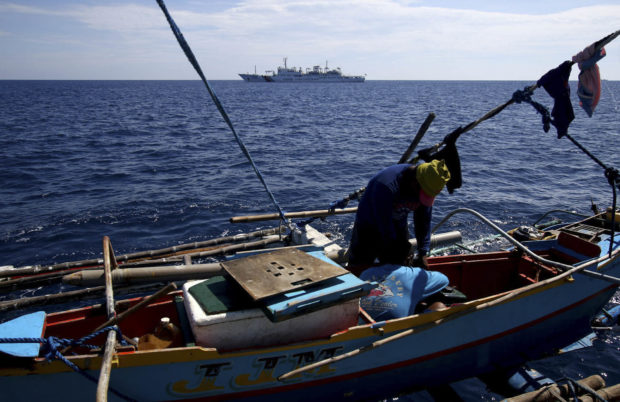
CHINA PATROL Filipino fishermen prepare to fish at Panatag Shoal while a Chinese Coast Guard ship patrols a kilometer away in this photo taken in 2016. —RICHARD A. REYES
The admission of National Security Adviser Hermogenes Esperon Jr. that Chinese fishermen have harvested giant clams and destroyed coral reefs at Panatag Shoal is enough for the Duterte administration to seek compensation from China, acting Chief Justice Antonio Carpio said on Tuesday.
Carpio said the government should file another case against China in the Permanent Court of Arbitration in The Hague, which has recognized the Philippines’ sovereign rights in the West Philippine Sea, waters within the country’s 370-kilometer exclusive economic zone (EEZ) in the heavily disputed South China Sea.
Report confirmed
Esperon, who also heads the Task Force West Philippine Sea, has confirmed a GMA 7 report last week that Chinese fishermen have damaged the line of coral reefs at Panatag, a rich fishing ground off the coast of Masinloc, Zambales province, that is internationally known as Scarborough Shoal.
“The arbitral tribunal already ruled . . . that China violated its obligation to protect and preserve the marine environment when China did not prevent Chinese fishermen from harvesting giants clams and destroying the coral reefs in the process,” Carpio said in a text message to the Inquirer.
“The Philippines was not awarded damages because it did not ask for damages. This time, the Philippines should demand damages for the economic losses of Filipino fishermen,” he said.
Carpio, a member of the legal team that argued and won the Philippines’ challenge to China’s claim to nearly all of the South China Sea, said Manila must also demand payment from Beijing for its refusal to let Filipinos fish in the lagoon of Panatag.
He said Beijing clearly flouted the July 12, 2016, arbitral ruling, which invalidated China’s sweeping claim to the South China Sea.
Common fishing ground
The ruling, Carpio added, declared that Panatag is the “only common fishing ground” of Filipino, Chinese and Vietnamese fishermen in the West Philippine Sea.
The United Nations Convention on the Law of the Sea explicitly states that China has the obligation to “protect and preserve the marine environment,” he said.
“The coral reefs are the breeding ground of fish and without them there will be no fish in [Panatag], which the arbitral tribunal ruled is the traditional fishing ground of Filipino, Chinese and Vietnamese fishermen,” he added.
International law, Carpio said, guarantees the freedom of navigation of fishing vessels from all countries within the Philippine EEZ.
Carpio said the same principle should apply to the territorial waters of China, Vietnam, Malaysia, Indonesia and Brunei in the South China Sea.
“However, only fishermen of the adjacent coastal state can fish in their country’s EEZ. Thus, only Filipino fishermen can fish in the EEZ of the Philippines in the West Philippine Sea,” he said.
Seized by China
Panatag, located 230 km west of Zambales and well within the Philippine EEZ, has always been known as a traditional fishing ground of Filipinos.
But the shoal was seized by China after a two-month maritime standoff with the Philippines in 2012.
The incident triggered a diplomatic row between Manila and Beijing, and prompted the Aquino administration to seek arbitration in the UN court in The Hague.